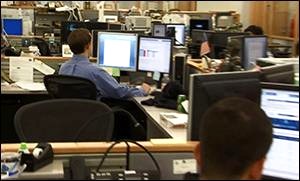By Pam Martens and Russ Martens: July 29, 2015

Photo of the Trading Floor at the New York Fed (Obtained by Wall Street On Parade from an Educational Video Despite Stonewalling by the New York Fed)
Your humble editor and publisher of Wall Street On Parade might have had a little something to do with a growing mutiny in Congress. Back on November 4, 2012 and again on July 25, 2013, we blew the whistle on an obscene, secret entitlement program between the Fed and the too-big-to-fail banks: a century old program where every year, boom or bust, despite the overall level of interest rates in the markets, the Fed pays out a risk-free, guaranteed 6 percent dividend to its member banks. (All Fed member banks get the dividend but the lion’s share goes to the biggest Wall Street banks because their capital dwarfs all other banks.)
Now, after more than a hundred years, there’s a plan in Congress to shrink that payout to 1.5 percent and fix our crumbling roads with the savings. Only banks with $1 billion or more in assets would be affected.
The Federal Reserve mandates that its member banks subscribe to “stock” in an amount equal to 6 percent of their capital and surplus. The banks have to post half that amount with the Fed upon becoming a member; the other half is subject to being called upon. The deposited capital translates into a corresponding share of “stock” in one of the 12 regional Fed banks. (The biggest Wall Street banks, of course, prefer holding their shares in their crony New York Fed.) The “stock” then pays out the 6 percent dividend to shareholders, meaning the banks.
If the bank had a hand in crashing the economy twice in the past century, say in 1929 and again in 2008 – like JPMorgan and Citigroup – it gets an extra bonus: its 6 percent dividend is tax-exempt. That’s because the statutes say that if the bank’s shares in the Fed were acquired prior to March 28, 1942 the bank doesn’t have to pay corporate taxes on it. JPMorgan’s roots reach into the eighteenth century while Citibank, part of Citigroup, traces its founding to the City Bank of New York in 1812. CEOs of both banks were shamed before Congress in the 1930s for their role in the crash of ’29 and again following the 2008 Wall Street crash.
But these two banks achieved even greater ignominy in May of this year: both pleaded guilty to a felony charge, admitting that they participated in a banking cartel to rig foreign currency trading. In other words, the Fed, the regulator of these banks, is paying this lavish 6 percent dividend to admitted felons while U.S. college students are going without food and heat and opting for prostitution to pay their more than $1 trillion in student debt – much of it saddled on their backs by these same banks.
In our 2012 article, we suggested the following:
“These ridiculously high dividends relate directly to our national deficit and the current debate on shared sacrifices. Any excess earned by the 12 Federal Reserve Banks after these dividends are paid is turned over to the U.S. Treasury and can be used to retire government debt. If the dividends were cut to 1 percent, commensurate with what other investors are receiving, billions more would be available to the Federal government. Ending the tax subsidy on the dividends would add billions more to government coffers over time.”
The current proposal before Congress to shrink the dividend from 6 percent to 1.5 percent is estimated to raise $17 billion over the next ten years. The concerns coming from community banks could be easily remedied by amending the requirement to include only banks with $10 billion or more in assets. (The biggest Wall Street banks hold $1 to $2 trillion in assets.)
Of course, the American Bankers Association was out quickly with its own lobbying effort, writing to Congress:
“We strongly urge you to oppose this proposal. As Senate Banking Chairman Richard Shelby has pointed out, there is absolutely no connection between the Federal Reserve System and the funding for the Highway bill. Furthermore, during testimony before the Senate Banking Committee on July 16th, Federal Reserve Chair Janet Yellen stated: “I would say that this is a change to the law that could conceivably have unintended consequences and I think it deserves serious thought and analysis.”
The ABA should know better than to make such a dumb, easily discredited statement. America’s crumbling infrastructure is a direct result of our Nation’s debt burden which limits what we can spend to maintain a safe, modern highway system. That massive debt directly results from the stimulus spending necessitated by these same Wall Street banks creating the worst economic collapse since the Great Depression in 2008-2009 and the ensuing subpar 2 percent growth over the past five years.
It’s long past the time to end this big-bank entitlement program.
Update: A reader has asked us to link to the full text of the Senate highway bill.

